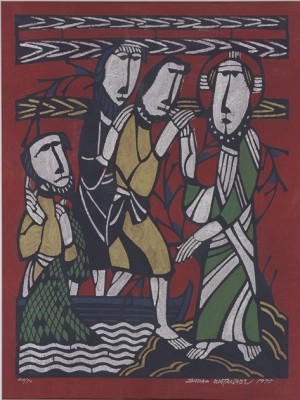| Christian
missionaries reenter Japan; converts seek to form a truly Japanese
church. |
 |
|
"Jesus
calls the disciples,"
woodcut by Sadao Watanabe, Japan, 1970
|
By 1858 political
changes inside Japan, together with international pressure, led to some
opening of Japan to westerners; not since the persecutions
in Japan (1614-1630) had missionaries been allowed there. Japanese
response to the gospel was more restrained than, for example, the Batak
people of Indonesia. However, in 1876
under the leadership of an American teacher, many students in Hokkaido
converted to Christianity. Several years later 200 students in Kyoto converted
and were baptized. Shimita Niishima (d.1890) was drawn to Christianity
and left Japan illegally to seek an education in the U.S. Baptized and
ordained, he returned to Japan in 1874 as a missionary. He founded Doshisha
University, a Christian school for higher education in Kyoto. This school
sought to integrate many Japanese traditions with a central commitment
to Christ. Japanese Christians early sought to make the church independent
and Japanese in character.
|